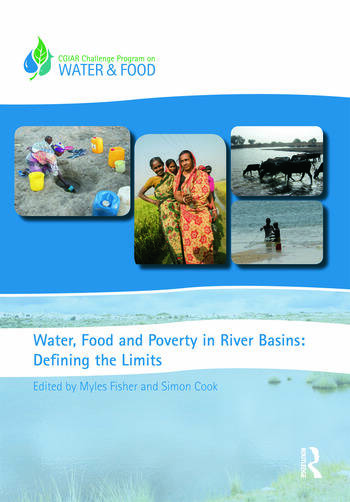A major study of 10 river basins, which was carried out over the course of 5 years with an investment exceeding USD 10 million, provides a valuable new perspective on water management. The study, coordinated by the CGIAR Challenge Program on Water and Food (CPWF), includes contributions from many scientists of the International Water Management Institute (IWMI).
The individual research results appear in two special open-access issues of the peer-reviewed journal Water International, published by the International Water Resources Association (IWRA): Volume 35, Issue 5, 2010 and Volume 36, Issue 1, 2011.
The study was also published as a book.

Water, Food and Poverty in River Basins: Defining the Limits
Edited By Myles Fisher, Simon Cook.
Published by Routledge in February 2012 (406 pages).
While it is convenient to visualize an inevitable global water and food crisis in which increasing demands result in increasing poverty, food insecurity and conflict, the reality is far more nuanced and revolves around the politics of equitable and sustainable development of resources.
The first part of this book provides detailed insight into conditions of water flows within nine river basins. In the second part, authors summarize and re-analyze the outcome of the nine basins, providing a coherent global picture of water, water productivity and development. They assess the impacts of variations of these attributes on development and approaches for poverty alleviation, and explore the institutional factors that support or obstruct change.
How people will manage river systems while protecting vital ecosystem functions will make the difference between catastrophe and survival.
“We are delighted with the release of the CPWF report. The findings are consistent with earlier work in which researchers from IWMI, the CPWF and numerous partner organizations determined that we have sufficient water to meet production goals of the future, provided that we manage our land and water resources wisely (Comprehensive Assessment 2007*). Yet, even though our resource base is adequate, we cannot rest easy on this reassuring news. In many areas, improving land and water management will require substantial investments in infrastructure, new policies and programs that reduce the farm-level risks of adopting new production methods. Developing water resources, alone, will not be sufficient.
We, at IWMI, are strong supporters of basin-level analyses of water resource issues, such as those presented in this report. Indeed, the basin perspective enables one to assess the upstream and downstream impacts of water allocation policies, and to determine opportunities for optimizing the sum of benefits across many residents.
At the same time, we must remember that poverty and food insecurity are often most severe – and most challenging – at the farm and household levels. Even in basins with substantial, untapped water resources, simply putting that water to work will not be sufficient to lift all residents out of poverty or to ensure their food security. In addition to basin-level analyses, we must also examine the economic, cultural and political issues that prevent so many households from gaining affordable access to the resources they need to improve and sustain their livelihoods.
In sum, we applaud the results of the study on major river basins coordinated by the CPWF, while redoubling our commitment to also maintain a keen focus on the issues that prevent so many poor households from gaining access to the land and water resources they need to achieve and sustain food security.”
Dennis Wichelns
Media release:
Major River Basins Have Enough Water to Sustainably Double Food Production in the Coming Decades

